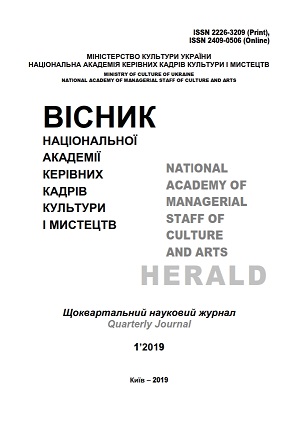An Alternative Model of Totalitarian Society (Through the Example of Leigh Brackett’s “Book of Skaith”)
An Alternative Model of Totalitarian Society (Through the Example of Leigh Brackett’s “Book of Skaith”)
Author(s): Olena Sergeevna KolesnykSubject(s): Fiction, Political Philosophy, Government/Political systems, Hermeneutics, American Literature
Published by: Національна академія керівних кадрів культури і мистецтв
Keywords: anti-utopia; science fiction; totalitarianism; Leigh Brackett;
Summary/Abstract: The purpose of the research is to go beyond the strict borders of the genre of anti-utopia and to study the depiction of dystopic social system in a work of the science fiction. The main methods are hermeneutics and the comparative analysis. The scientific novelty. For the first time Leigh Brackett‘s work is researched as an example of sociological and culturological modelling with considerable prognostic potential. Conclusion. In Brackett‘s ―The Book of Skaith we see not a typical for anti-utopia ―island society, but a whole planet. This implies a whole new level of complexity. The author shows how the changes in environment influence different interconnected societies. This modelling of civilization under pressure can be seen as an implicitly-culturological study of political, social and cultural dynamics. An important ethical topic concerns the degradation of the best ideological principles if they are not adapted to the changing reality. The image of society, where social programs breed a considerable strata of people, who never worked is disturbingly relevant. Almost all depicted social groups develop such protective reaction to the crisis, as the search for oblivion. Brackett shows different variants of escaping from the unbearable knowledge of the impending catastrophe: hedonistic attempts of living in a moment, totalitarian religions etc. Even such intellectual activity as studying history can become an obsessive immersion in the past as a way of escaping the present. That is why ―The Book of Skaith can be viewed as a warning about the consequences of some tendencies of the contemporary (late ХХ – early ХХI ct.) civilization. In this it differs from many anti-utopias, whose futuristic entourage masks the habit of depiction of the already well-known social ills, and in the forms more typical for the first half of the XX ct., than for our own days.
Journal: Вісник Національної академії керівних кадрів культури і мистецтв
- Issue Year: 2019
- Issue No: 1
- Page Range: 60-63
- Page Count: 4
- Language: English

